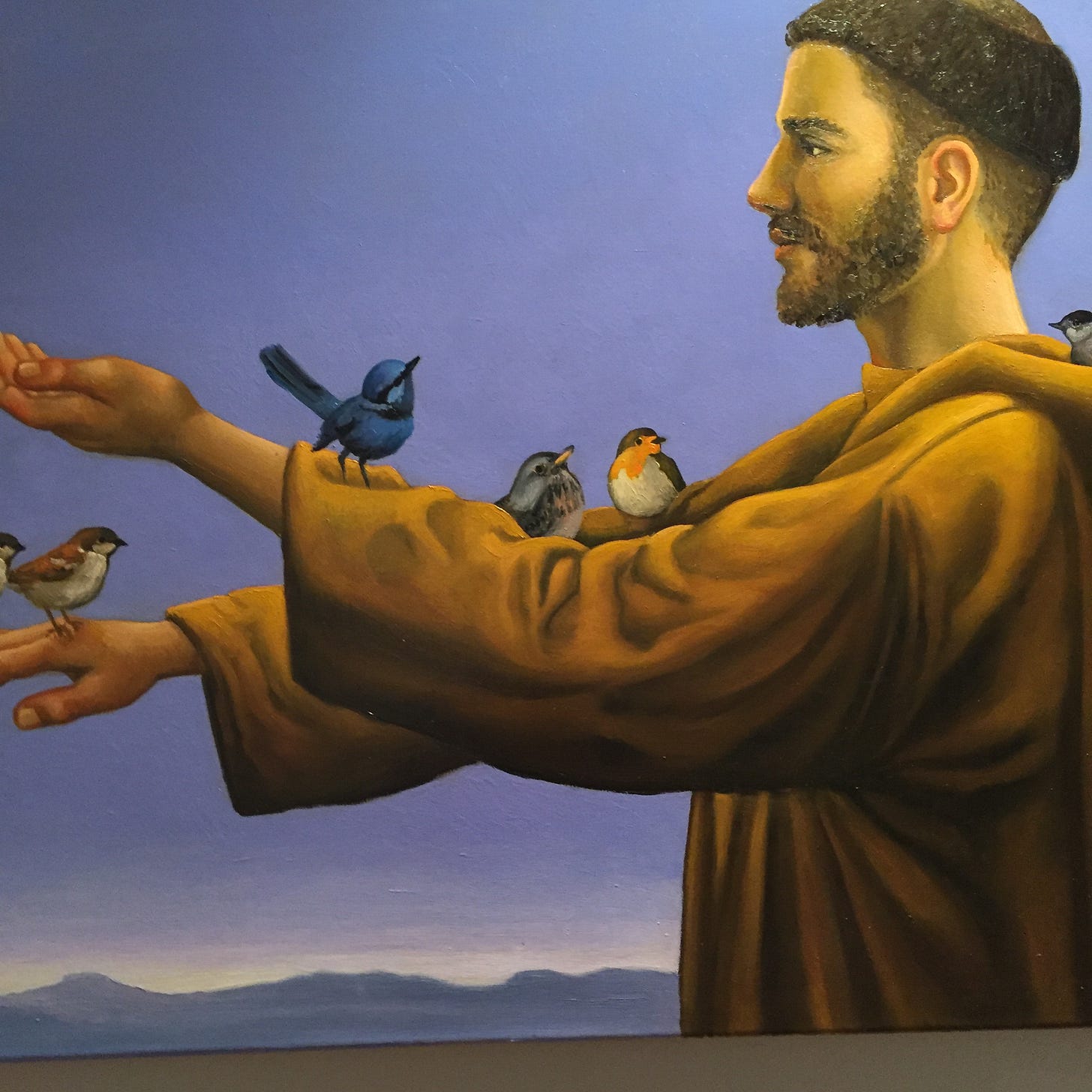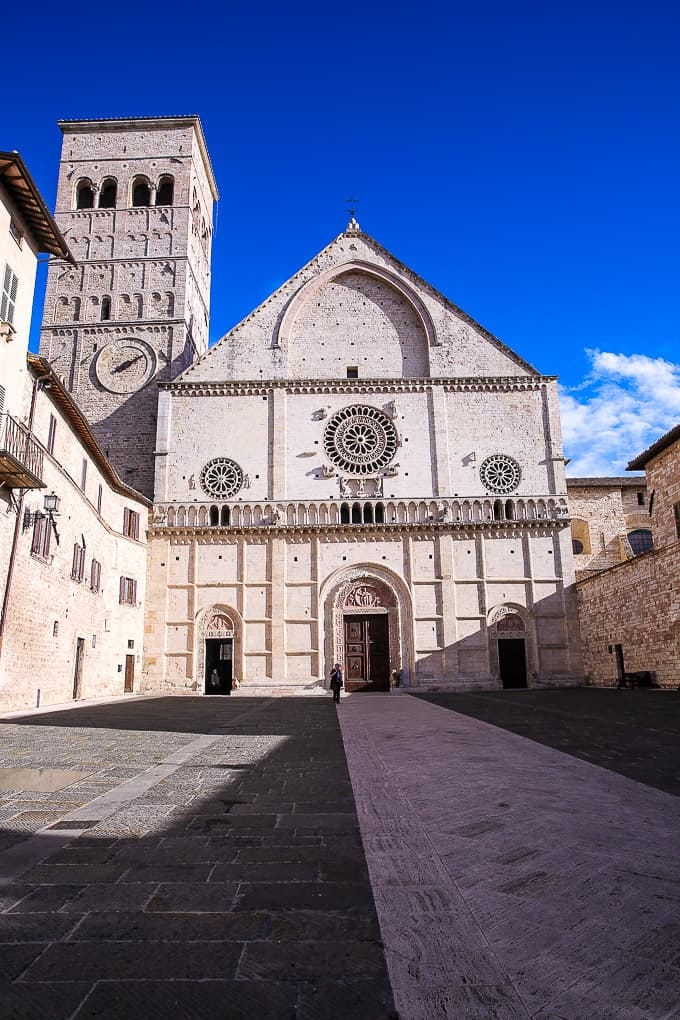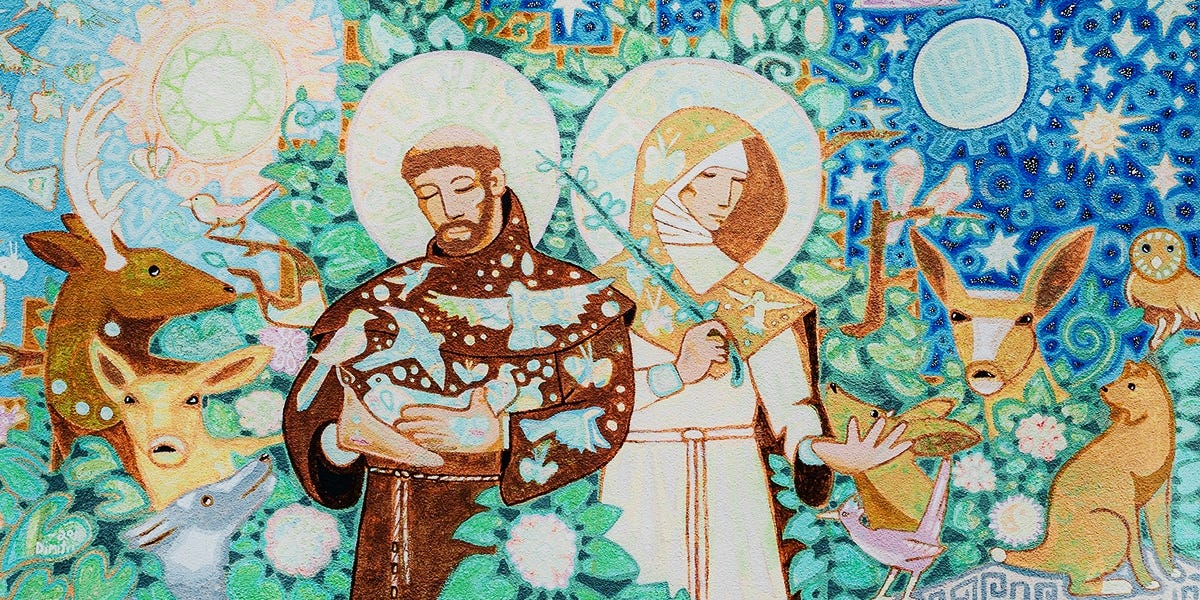Preach the gospel at all times. If necessary, use words.
Advent Day 3: Francis of Assisi (1182-1226)
Some people are hard-wired for what the apostle Peter called joy unspeakable (1 Peter 1:8). You probably know someone like this—no matter what valley they’re walking through, it is well with their soul. They might not be happy all the time, or even much of the time, but they’ve always got joy. Francis of Assisi was just that kind of guy.
Francis was born in 1181 to a family of Italian cloth merchants. Like most children in the Middle Ages, his social class set his life’s course. As the son of a well-to-do family, it was expected he would marry a member of the same class, have children and enter his father’s business. Before then, he had ample free time and money to spend on wine, women and gambling.
In 1202, seeking adventure, Francis joined a military expedition against the nearby city of Perugia. But rather than finding glory on the battlefield, he was captured and tossed in jail where he languished for a year before being ransomed.
The Francis who returned to Assisi was not the one who’d left. Prison had transformed him from a frivolous boy into a mystic with a heart for the way of Jesus. Now, rather than join his father’s business, he began to pilfer silk from the family warehouse so he could sell it and slip the money to a local priest.
When Francis’s father got wind of the scheme, he had his son arrested, dragged to the public marketplace and put on trial before the bishop. Not one to be outdone in the grand gesture department, Francis stripped off his fine clothing before the scandalized crowd. Naked, he renounced his inheritance and pledged his devotion to the poor and suffering of the world.
Francis didn’t stay naked for long though. Soon, he donned a coarse brown beggars’ cloak, tied it with a rope, and took up residence in the woods outside Assisi. Far from missing his old life of luxury, he radiated joy and radical freedom.
Like all mystics, Francis felt the deep intimacy of the Incarnation. If it was true that God loved things by becoming them, then all creation must contain God’s divine DNA. God was in trees and rocks and river, the beggars and lepers among whom Francis now lived and, yes, even his father. This God-in-everything spirituality led Francis to praise as siblings his Brother Sun and Sister Moon, Brother Wine and Sister Water. Like this, his life became a prayer, his lifestyle the only message he needed.
This message quickly attracted followers. Once Francis had been joined by twelve others, he knew it was time to create a rule for the rag-tag bunch to live by. The rule was as simple as it was profound:
…to follow the teachings of our Lord Jesus Christ and to walk in his footsteps.
This meant taking a vow of poverty and nonviolence, and not only caring for but seeing God in all creation, no exceptions. And if anyone wondered what Francis’s inspiration for this rule was, they needed only to open their Bibles and read the stories of Jesus.
Not surprisingly, Francis the holy fool became the butt of his old drinking buddies’ jokes. Nor was he popular with the local priests who feared that Francis’s radical simplicity and devotion to service would draw negative comparisons to their comparatively luxe lifestyles. Nevertheless, Francis’s joyfully liberated life continued to attract followers including, in 1212, a young woman named Clare.
It didn’t take Francis long to see that, in Clare, he’d found a kindred spirit. They’d both abandoned a life of privilege. They shared the same God-in-everything spirituality and devotion to service. Together, they possessed the organizational skill, spiritual energy and personal charisma to grow their newly-birthed religious order—Francis among his Little Brothers, Clare with her Poor Ladies.
Theirs became among the most fruitful spiritual friendships in history. Yet, today, their success in movement-building sometimes obscures their deep personal bond. Clare was Francis’s most trusted friend, confidant and advisor. Francis was Clare’s soul companion, someone who, like her, was willing to risk everything to carry God’s love into the world. They worked, played, planned and prayed together. According to author Mirabai Starr in her book Saint Francis of Assisi: Brother of Creation,
Their love (was) as intimate as any...They loved each other with heartbreaking passion…yet they remained celibate. Their love for each other was no more, no less, than a mirror of their love for the Source of All Love.
It is rare enough now to find such deep friendship between men and women. During the time in which they lived, it was simply unheard of.
For a dozen years, they spread the gospel of simplicity, service and joy, Francis from his base in Assisi, Clare from nearby San Damiano. They met more success than they ever could have imagined. Maybe too much success. By the 1220s, Francis in particular began to fear that the movement’s growth had dimmed its original fire.
When stress over this caused his health to falter, Francis retreated for a time to San Damiano to be close to Clare. There, he wrote his most enduring work, The Canticle of Brother Sun and Sister Moon, which sings praises to the qualities of nature which he saw mirrored in his soul friend Clare: humility, purity, peace and perseverance.
Francis’s last two years were marked by those strange and seemingly incompatible twins: physical pain and peace that surpasses all understanding. When the end was near, his friends carried him to Clare so she could say goodbye. After their parting, a distraught Clare fell severely ill.
As death closed in, Francis’s brothers laid him on the bare ground of his hut. Then he offered them one last blessing:
I have done my part. May Christ teach you to do yours.
Francis died on October 4, 1226 at age forty-five. A friend to every experience, right to the end, his last words were, “Welcome, Sister Death.”
Practice
The Prayer of Saint Francis is one of the world’s most beloved devotional texts. It is a call to spiritual friendship not only with those around us, but to all we meet, and to the world at large. Today, read this prayer as a lead-in to your own time of prayer or meditation. Pick a line or two that particularly speaks to you, or that expresses a need you see in those around you. Then, give thought to how you might embody the line throughout your day and the rest of this Advent season.
Lord, make me an instrument of your peace.
Where there is hatred, let me sow love;
Where there is injury, pardon;
Where there is doubt, faith;
Where there is despair, hope;
Where there is darkness, light;
Where there is sadness, joy.
O divine Master, grant that I may not so much seek
To be consoled as to console,
To be understood as to understand,
To be loved as to love;
For it is in giving that we receive;
It is in pardoning that we are pardoned;
It is in dying to self that we are born to eternal life.
Holiday Happenings at Life In The City
All in-person gatherings listed below happen at 205 East Monroe St. in Austin, Texas.
Dec. 8, 11:15 am: LITC’s original musical, Make Room In Your Heart. Dec. 21, 6:000 pm: Blue Christmas, an intimate service for the longest night. Dec. 23, 6:00 pm: Christmas Eve-Eve, and LITC tradition. Dec. 29, 11:15 am: Welcome 2025 with a fun, casual service that includes cookies, coffee and resolution-setting.
Contemplation In The City
Life In The City’s contemplative community meets regularly to practice sacred traditions like Lectio Divina and Centering Prayer. If you’re in Austin, consider joining one of our gatherings. You might also find meaning in our monthly newsletter in which we wrestle with how to live a spiritually engaged life in the modern world. Read more here.
Ready For More?
Read the Introduction to the 2022 edition, to find out how my experience of September 11, 2001 became my gateway to Advent.
Read the Introduction to this year’s edition of The Heart Moves Toward Light: Advent With The Mystics, Saints and Prophets.
Find more mystics, saints and prophets in our Archive.
Feedback
Catch a typo? Have suggestions for mystics, saints and prophets for a future year? Leave feedback in the Comments below or email Greg Durham at greg@litcaustin.org.






